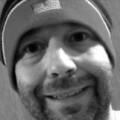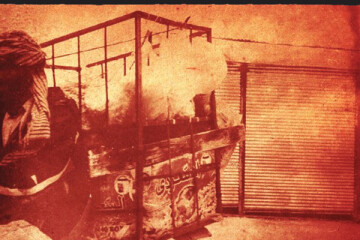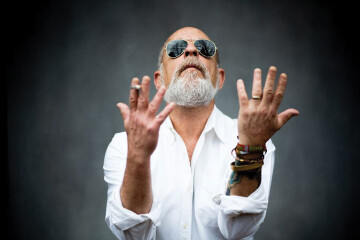Catching Up With Steve Drizos
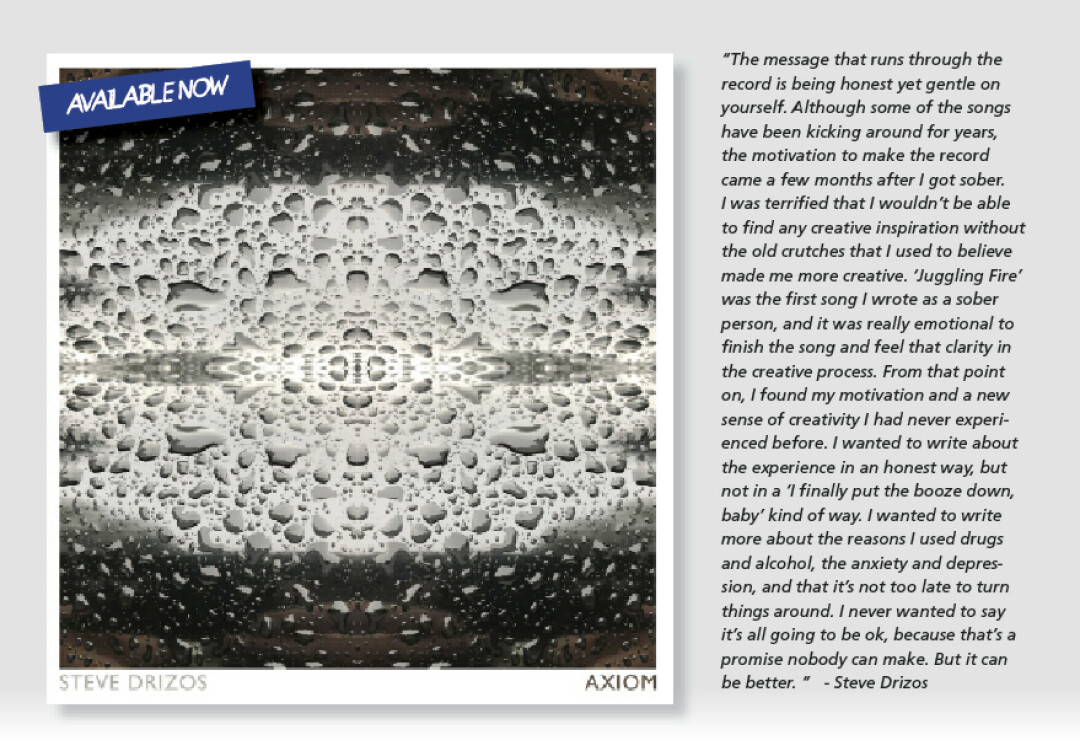
Brian Ripple: Let’s start back at the beginning. Where did you go to high school? Then you can take it from there.
Steve Drizos: Well, I grew up in Upstate New York, right outside of Albany, in a town called Scotia. So I went to Scotia High School and then I went to college in a town called Oswego, NY and that was a state school north of Syracuse on Lake, Ontario. I did three semesters there before I started touring with Dexter Grove... and that was the beginning of the adventure.
BR: What year did you graduate high school?
SD: 1991. Thirty years ago. That’s an anniversary for you.
BR: If you can remember back 30 years ago, do you know who you were listening to in high school?
SD: I went through some crazy phases. Most of my high school years I was a hard rock/metal guy. I went from classic rock like Zeppelin and The Who to Motley Crue and Slayer, Scorpions, all those big hair bands. And then somewhere later in high school, probably my junior year I heard Life’s Rich Pageant, the REM album that shifted things dramatically for me and I started to get into more I guess what you would call College Rock back then. So I kind of left my metal behind and started to explore that genre of music. It was a little more intellectual, right? As I was getting into being a brooding teenager, you know, nobody ever really understood me, and Michael Stipe’s song lyrics really seem to just resonate with what I was going through at that age.
BR: Nice, I love REM. So at what age did you start playing music?
SD: I started playing the drums when I was really young. My dad was a musician, a drummer mostly, not professional but semi-professional I guess you’d say, but that’s really where my love of music came from, and so there were always drums around. Ever since even before I can remember I was banging on stuff. I started taking lessons when I was 10 years old, and studied through high school and college. I played in the orchestra and bands and Jazz ensembles. I started playing guitar when I was probably 15 or 16, and started exploring original songwriting pretty quickly as well, just as a way of expression. I was really into poetry and so was writing pretty simple three chord songs pretty early on.
BR: So all that kind of culminated with going to state college in Oswego is how you ended up in the Dr. Gravy, oops I mean Dexter Grove thing?
SD: Not Dr. Gravy! (Laughs all around)
Yes, Dexter Grove started in Oswego. Charlie Orlando was the other half of Dexter Grove and he was a few years older than me. I think he had already graduated by the time I was at school, but we met through some mutual friends and he was in a local band at the time, and that band broke up, and we had been playing sort of casually at the local bar once a week and decided we wanted to keep it simple as a duo. I was playing percussion and he was on acoustic guitar and vocals, and logistically it was really easy for us to just start traveling kind of right out of the gates.
BR: What year was that when you started touring with Charlie?
SD: We started touring in earnest in ‘95. That’s what we call the beginnings of Dexter Grove.1995 yeah, we just started booking as much as we could. It’s was really easy as a duo. We could play coffee houses. We could play restaurants. We could play bars. It was pretty wide open for us.
BR: And you continued that for a while?
SD: Yes, for 10 years.
BR: I believe that’s when we first met. When you were in Dexter Grove and you were playing in the MSU Leigh Lounge and I ran sound for you guys.
SD: Yeah, that was not the first time we ever did that MSU Lounge gig, but we did continue to do that for several years.
BR: Didn’t you say about ten years later roughly 2005? And then at some point did you end up in Bozeman?
SD: I never actually lived in Bozeman. At that point I had been to Portland a bunch on tours and had a base of really close friends there from college in New York who had moved out there, and I decided that’s where I wanted to land. I wanted to try it out because I’ve always loved Portland. I loved the music scene there and the music community. So I packed up all my belongings and and headed to Portland.
BR: And you’ve been in Portland ever since?
SD: Yes. I moved here in September of 2004.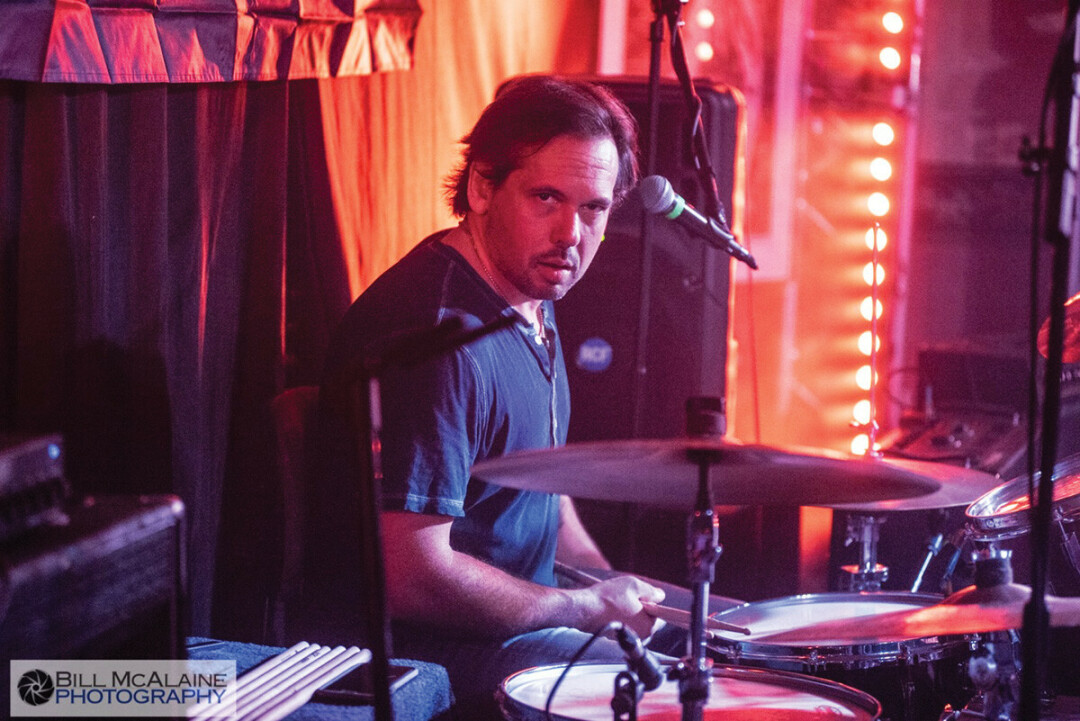
BR: What did you do music-wise between Dexter Grove and when you started playing with the Jerry Joseph & the Jackmormons?
SD: The first gig I had in Portland was playing with Dave Andrews who was in the band Colobo. They were a pretty popular Pacific North-West, Rocky Mountain Band. So I did that for for a few years, and I had known Jerry and the Jackmormons from Dexter Grove tour. We used to play shows together quite frequently. So my transition into the Jackmormons was, it was pretty right away. But it was also gradual, it wasn’t like you’re a member of the band. I would kind of sit with them frequently. Brad was still the drummer for many years while I was playing percussion in the band, but I would say I sort of officially joined the Jackmormons, probably 2006.
BR: Where was Jerry living then?
SD: He was also in Portland.
BR: Okay. I had first met him when he was living in Bozeman when he was playing and booking the Zebra.
SD: Yeah, me too.
BR: I moved here in ‘95 and the first job I had was at Big Sky Screen Printing working for Ron, the drummer of Hooligans, which is Tom’s Garnsey’s (Vootie Productions) band. Jerry would swing by to hang out and say hi to Ron ocassionally. I didn’t really know who he was other than the dude that played at the bar at that point. Ironically he was one of the first people that I stumbled across when I moved to Bozeman.
SD: Yeah, we met Jerry because of Garnsey. I’ve had this debate with with Tom and he doesn’t seem to recall the facts, and I’m sure by this point I do not as well. But I seem to remember that we were supposed to be playing, opening for Leftover Salmon on campus in Bozeman, and either we got cancelled, or the gig got canceled, but we were still on our way and Tom was like “oh you’re going to be in town, you should go down to the Zebra and meet this guy Jerry. He’ll probably booked you for a night or two while you’re in town” and that’s how we met Jerry.
BR: Cool, so that was in 1996? You started doing shows with him? Was that when he was doing solo stuff or Little Women still?
SD: What he was doing was the Jackmormons, but they were called the Jethro Belt at the time. They weren’t even called the Jackmormons yet. I can remember we played the Zebra with Los Hermanos Brothers. I think we played the Silver Dollar in Butte, and I want to say we played Great Falls on that first run of shows together. It’s hard to remember like you said 30 years of touring.
BR: So do you remember your first recording that you did with Jerry?
SD: Yeah, the first recording was the album “Into the Lovely”. I was fresh in town. It was probably either 2004 or 2005 and and I was a guest on that record playing percussion.
BR: Right. Brad (Rosen) was still drumming?
SD: Brad was still playing drums, yeah.
BR: Do you know how many albums you’ve done total now with Jerry and/or the Jackmormons?
SD: There was “April 19th”.
BR: Which is also your birthday?
SD: Yeah, but it’s also the name of the record.That was one of the bonding moments for Jerry and I was the fact that we shared a birthday. Then maybe “Badlandia” might have been after that. 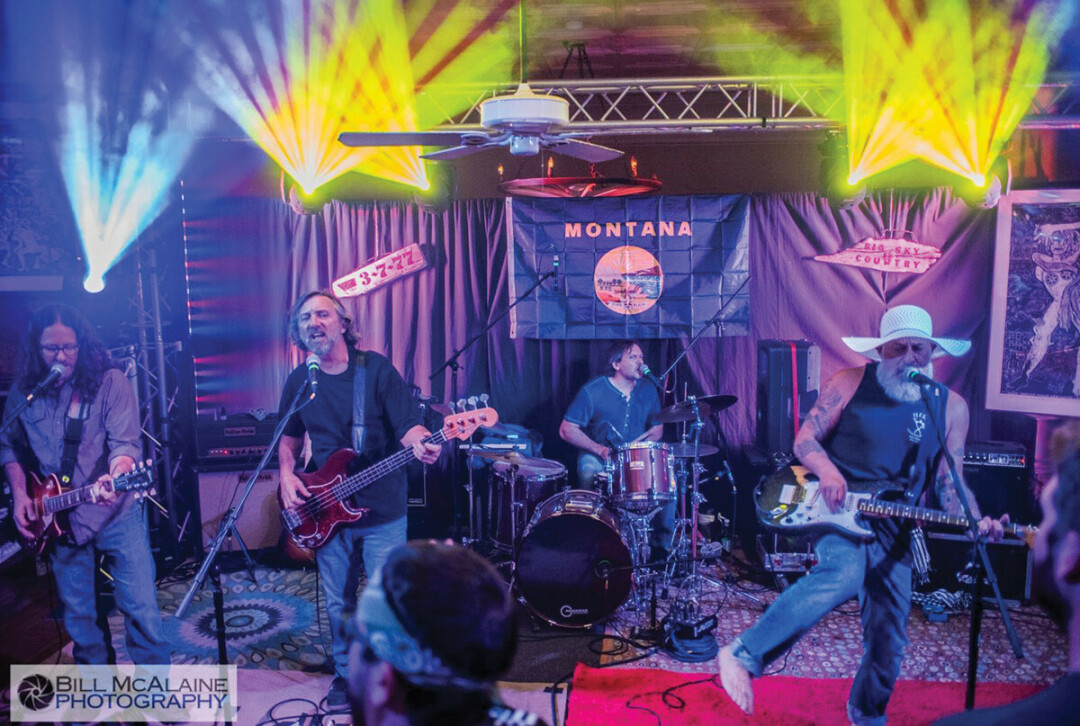
BR: That’s a great one. Was that one of the first years you guys played Virginia City?
SD: That was like maybe the second or third year of VC. Let’s see then maybe “Happy Book”, and “By The Time Your Rocket Gets To Mars.” “Weird Blood.” I’m sure there’s a few more, probably seven or eight records I’ve done with Jerry at this point.
BR: I think you’re missing a couple, so maybe this will be easier to remember... What are some of your biggest highlights from playing live or touring experiences playing with the Jackmormons?
SD: That’s a good question. That’s a tough question. I’ll try to recollect.
BR: All just one big blur?
SD: It’s one big blur yeah. I don’t know if I have them ranked in any particular order, you know, I would say just speaking of Virginia City, I would say in general just the Virginia City experience and the introduction and the run of multiple years that we have done. That in itself has certainly been a big highlight of my time with Jerry and the Jackmormons. It’s not a singular experience, but it’s just the whole thing.
Playing the Telluride Festival a few years ago and Pearl Jam was the headliner, that was a really great experience.
Playing with Jerry, and as far as touring goes I’d say the tour that I did with him of the Middle East was one of the most amazing experiences of my life. Playing in, and going into Beirut and Israel was just, wow. Yeah, that experience was just, maybe not life-changing, but it was certainly eye-opening. Just one of the most amazing experiences of my life.
BR: When you play shows in that part of the world, how similar is it to when you’re playing in Butte or Virginia City?
SD: You’re playing some bar where nobody knows who you are or gives a shit who you are, but you know you’re in Beirut, so you’re like, this is fucking cool. But you still know, there’s nobody there who is there particularly to see you. They just happen to be there.
BR: Well, that’s good that they have places like that. I guess.
SD: Yeah. There were a few shows in Israel that we played in particular, we played a show on a kibbutz. I must inform you about kibbutzes, it’s basically like a place where young people go to live and they work and they learn skills and it’s very similar to a commune. We played a show in Israel, I can’t remember exactly where it was, and it was just this youthful energy of live music and it was just really amazing, that sort of feedback from a foreign audience.
BR: Nice. And I’m sure you miss it? I know I do.
SD: I miss some of it, I don’t miss all of it. I don’t miss the long drives and the time in the less than amazing hotels.
BR: So with the pandemic in lieu of these grand experiences and places like Telluride and Beirut and everywhere in between such as Virginia City, you guys have been doing weekly livestreams with the band and your wife Jenny, called Happy Book Live, every Thursday. Which is awesome, at least for us it is. Hopefully it’s awesome for you all too.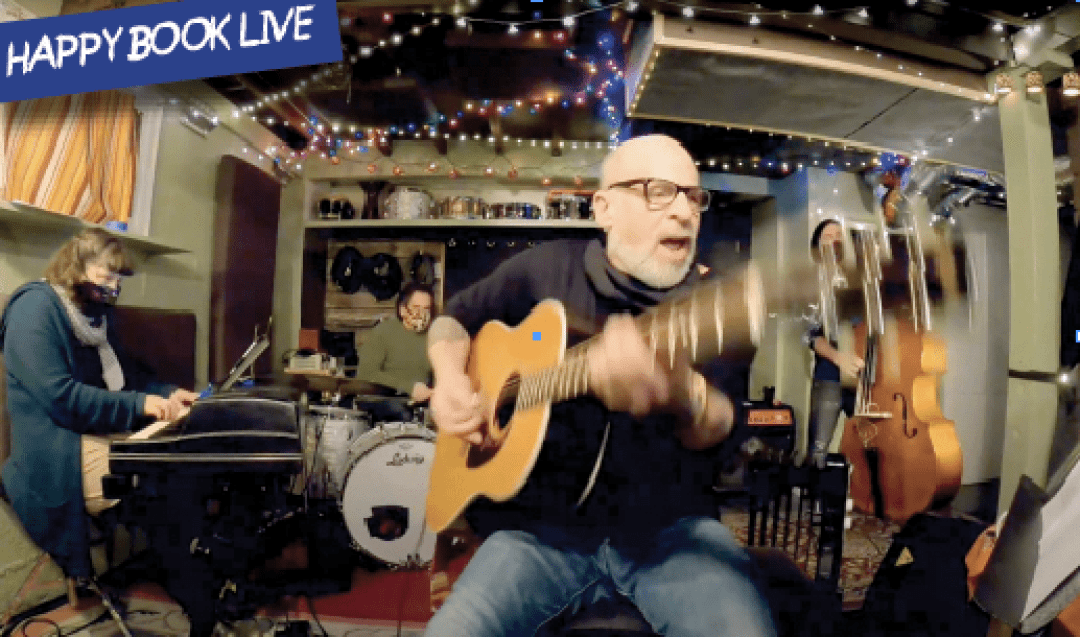
SD: It’s been great. We started last March when things in Portland shut down and the writing was on the wall that this pandemic was legit, and it was not going to be going away in just a few weeks like people had sort of predicted in the beginning. At that point Jerry and I, talked at great length about what we were going to do as a band.
We, as well as thousands of other musicians, got on the livestream thing pretty quickly, but we wanted to try do something a little different as far as the production level, and you know trying to be safe and comfortable. We wanted to try to keep playing as a band as opposed to just Jerry doing it on his own, and it’s been sort of a work in progress ever since then.
The one thing that Jerry was adamant about was he wanted to do it every week without compromise in some fashion whether it was the band, or just him. A few weeks ago he wasn’t able to make it, so Jenny (Conlee-Drizos) and myself did it, but we’ve done it every week for I think we’re at week 47 or 48 now.
BR: That’s awesome. It’s something your fans can look forward to every week because of setting it up that way it’s like looking forward to watching The Cosby Show or Family Ties or whatever, you know it’s coming every week and you can kind of set your clock to it. In this messed up world we live in it’s one thing that we’ve learned to be able to count on, so I know all your fans applaud you for that.
SD: Thank you for saying that. I mean it’s really great to hear that, and that was our intent; that we wanted to have something regular and steady. It’s a really strange thing where your whole career you are feeding off this energy from the audience and now you have to learn how to play in front of a camera with zero feedback. I felt like the first couple weeks, or even first few months, it was sort of like playing into the void. Like I think people are watching, I think people are liking this. I think this is good, but you don’t really know.
Then when we were able to do one of our few outdoor shows this summer, the reaction from people, and the looks on people’s faces as they were thanking us for doing Happy Book, it was like, oh yes, this is working. This means a lot to people and it means a lot to us too. I mean, this is helping us out as well, we have something to look forward to every week and we can play music, but that’s when we realized that it was actually resonating with people and it was important and that was really affirming, yes we’re doing the right thing.
BR: Right well, and it didn’t all just happen entirely by accident. I guess there was some luck in planning and things that happened way before the pandemic, like your studio, The Panther, being there for instance.
SD: Yeah, that’s very fortuitous to have the studio operational for many years before the pandemic, but the end of 2019 I did a pretty significant remodel on the space. And yeah, the timing could not have been better to have an environment where we can set up and feel safe and feel comfortable and be able to broadcast weekly from there.
BR: Besides the Happy Book shows you’ve been doing some recording too? You recorded your own album and some other bands during the last year and a half?
SD: I had to shut things down except for the the Happy Book for the first few months for obvious reasons, and then as things sort of started to I guess level off and feel safe this spring and summer I opened my doors to solo artists where we could do safe recording sessions.
I did a lot of remote recording and mixing projects. And I was able to finish my record which you know, I was really close to finishing it before the pandemic, but it just gave me the time I needed to get past the finish line.
BR: Where were you at on that, it was basically done? You said you were just kind of adding a few tracks and had to mix it down?
SD: I just had a handful of backing vocal tracks to finish and just final mixes, and so I was able to finally have the time to really focus on it, and to be honest sort of run out of excuses as to why why I couldn’t finish it.
BR: Exactly, one of those silver lining scenarios. It’s like time staring you in the face now, okay, now to have to do it.
SD: Right, just do it.
BR: So now we are talking about your new solo album “Axiom” and your quote is “I have been watching from the sidelines for twenty-five years, taking notes on what and what not to do. I’m using all those observations now in my own music.” Axiom is your first solo album, right?
SD: Yeah. I mean, I’ve been in the music business for a long time and have made lots of records as not ‘the Person’ and I think over the years I learned what works and what doesn’t work from my perspective, and I was able to kind of take all that information and use it to put out the best record that I thought I could put out with all the knowledge that I had up until this point.
BR: It was relatively easy in that sense?
SD: Oh, I wouldn’t say that. It was a lot of second-guessing myself. I mean the whole record, you know, I started recording the record probably four years before it actually came out. So it was a long process, some of it due to just my other job of touring and having other clients in the studio, but most of it was a lot of insecurities, never being a front person, or having my name front and center on a project before. There was a lot of second-guessing myself and having a band to sort of bounce ideas off of it was very insular. And so one day I was like wow, this is great and then there will be long stretches of this is terrible and I’d have to try to remix it and second-guess everything. So yeah, I don’t think it was an easy process, but it was the necessary process, and I learned a lot from it.
BR: What percentage of the album would you say is you playing, as opposed to guests?
SD: Probably 70% of the record. I wrote all the material, all the music and lyrics. I played all the drums, played all the guitars except for one solo. All the lead vocals. I played bass on a few tracks, a little bit of keyboards on it. Yeah, that was all stuff that I performed myself.
BR: Were these songs that had been around for a long time, or were they songs that were specifically written for the Axiom album?
SD: There were two of the tracks that I had been kicking around for a long time, but the other six were all material that I either just had a rough sketch of and I was able to finish them during the time of that four-year window, or they were they were brand-new songs that I had written in that time frame.
BR: Nice, any particular favorites at this point? I know that’s hard. That’s like picking a favorite child or something.
SD: No, I mean at this point I can look at it as an entire sort of body of work as opposed to individual songs. So yeah, it’s really hard for me, I guess if I was to pick a favorite the final track titled ‘Liminal Space’ would probably be my favorite.
BR: That’s a good one for sure, but what you were saying is really none of them stand out and you more see it as a cohesive album. Do you see an overall theme to the album?
SD: There’s a theme. The overall of what I was going through at the time. I mean I’ve talked about it in the press because me getting sober and just dealing with that and with a lot of the issues that are behind the reasons that someone like myself was an alcoholic or used drugs.
I was dealing with issues of depression and anxiety and so I gave myself permission to let my guard down and be really open about those very personal things to me. And that’s what it became. It wasn’t intentional at first, but that was the direction it kept going. So I just said okay, this is what this record is going to be about.
BR: I guess that’s kind of what I was wondering. Is it what you set out to do, or it just became apparent that that’s what you were writing about at that time? Which is what you said. It’s about where you're and what you were going through. Very personal.
SD: Yeah, it was especially in the days of early recovery. So many of those raw emotions are just on the surface, and it wasn’t hard to tap into something deep. It was just really broad and wide open and I was just documenting what I was experiencing at the time, right?
It’s a good thing to have really saved my life. I mean that sounds pretty cliché. But it really did, it gave me something to focus on, you know early on especially, and I kept my mind occupied which was an amazing thing to have that just coincide.
BR: You decided you were gonna start writing an album and then you decided you’re going to get sober? Or was the plan more intertwined?
SD: It was intertwined. I finished writing songs, and so once I had some clarity in my life and was able to sort of see creative ideas through to the end it just sort of organically started to happen. I wasn’t like ‘I’m sober and I got to write a record all about it’. It just kind of started happening as a project to keep me busy, and then one by one the songs came out and I would record that.
And then it was like, okay, something is developing in front of me that I should really follow this thread. And then I got encouragement from friends and family alike. “You know, maybe you should think about putting this out.” And so that’s kind of how the whole thing unfolded.
BR: Awesome, and like you were saying from your perspective with the pandemic and the way the world is, it’s a great time to be able to release it because you don’t really need to feel any obligation to tour.
SD: It really is. Yeah, I love working in the studio. I love everything about it, but mostly I loved the controlled environment of the studio setting. And, you know going back to what I said earlier about watching from the sidelines for so many years, one thing that was very apparent to me at this stage of the game is that being a band leader has no allure to me because I see how stressful that is. So yes, I didn’t have any intention of putting a band together and touring it. I certainly want people to hear the record. And so this time we’re living in; where people are at home but still consuming music, it seemed like a really opportune time to release it.
BR: Yeah, it does, and you’ve released it on all the digital platforms?
SD: Yes, it’s available on all the streaming platforms as well as you can order physical copies like vinyl at my website which is: www.stevedrizos.com.
BR: That’s where they get the Panther shirts too?
SD: Yeah, exactly all the merch is on there.
BR: Cool, what else is there?
SD: Yeah, just the link to the Happy Book shows so people can catch those if they haven’t. And, please make sure it’s Dexter Grove not Dr. Gravy. (Laughs)
BR: Yep. For sure. I can’t believe I even said that. I just wrote down DG and then it came out wrong. My bad, that’s hilarious.
________________________________________
Watch Happy Book Live Thursdays at
7pm MST on www.youtube.com or
www.facebook/jerryjosephmusic
You can order the album Axiom and Panther Studio merch at: www.stevedrizos.com
